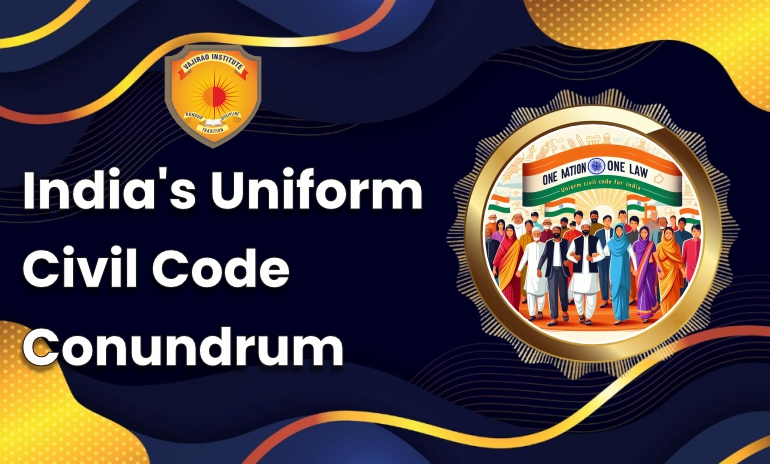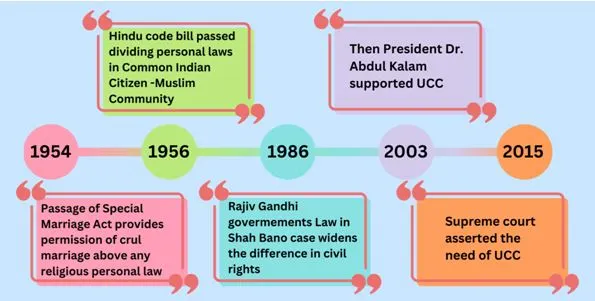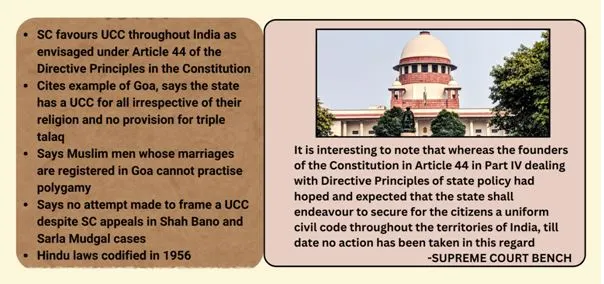
The UCC has remained a divisive concern in India since long and occupies a definite and rather complicated place in the legal and socio-political contexts of the country. In essence, the UCC was designed to bring about the elimination of the current state of affairs in which various religious groups practice their personal laws concerning marriage and divorce, inheritance and adoption etc.
What is the UCC?
The UCC means a single set of laws for all legal acts of the citizens of India in the matters of their personal life without any discrimination of religion. It includes issues to do with marriage and divorce as well as the adoption of a child, inheritance, and succession. As provided under Article 44 of the Indian Constitution, the UCC is a part of directive principle of state policy, indicating that the law cannot be binding and implemented in the society as legislation, rather it is just a guiding principal of the State.
India's Uniform Civil Code Conundrum
Historical background
1. Colonial Era Origins:
- It is however important to note that the UCC can be traced back to colonial India. The British government in 1835 presented a report which underlined that there was a pressing need to have a uniformity of Indian law.
- Notably, while they framed laws about crimes, evidence and contracts, they refrained from medalling with the private laws of Hindus and Muslims. These personal laws were governed a lot by religious customs and beliefs.
Diverse Family Laws:
- India’s diversity in not restricted to geographical and linguistic but religious and cultural as well. Thus, there were multiple family laws (personal laws) applicable to marriage, divorce, succession and adoption as per the religion the particular community to which a religious community belonged.
- Personal laws which were principles that had been inherited from previous eras for a certain community are criticized for discriminating women.

The Constitutional Vision:
During the making of our constitution, there was a huge discussion regarding UCC. Dr. B.R. Ambedkar and other members of the Constituent Assembly believed that a UCC was essential for several reasons:
- Gender Equality: A UCC would promote the protection of the rights of women particularly in marriage and other issues.
- Secularism: It would create a secular state since all the citizens would be treated as equal without regards to their beliefs.
- National Integration: The establishment of a common civil code shall be beneficial to the unity of the country.
- However, when it came to implementation issues arose as the country had personal laws and religious differences and the UCC was sensitive to these issues.
Post-Independence Efforts:
- Despite the debate, successive governments have wrestled with the UCC matter. It is also pertinent to note that some daring measures were made to secularize and modernize the family laws.
- The Hindu succession act was amended by passing the Hindu succession Act 2005, that eliminated gender bias in the succession laws of Hindus. However, other personal laws are up to this point still remaining way behind.
The On-going Debate:
- Thus, the UCC topic can still be considered as controversive. Significantly, even the 21st Law Commission mentioned the demands for the enactment of UCC and underlined the needs for the reform of the laws of religions and marriage pertaining to both sexes equally.
- The dilemma of tradition, cultural practices, and the proportion of gender equality still remains an issue for Indian policymakers and legal scholars.
Major Supreme Court Rulings in relation to the UCC in India;
 1. Paulo Coutinho v/s Maria LuizaValentina Pereira (2019)
1. Paulo Coutinho v/s Maria LuizaValentina Pereira (2019)
- Indian Constitution’s framers have envisaged the UCC in the Article 44 under the Directive Principles of State Policy. However, till date, no systematic move has been made to formulate a UCC which should apply to all the citizens.
- Yet, since codification of Hindu laws in 1956 there is still no uniformity.
2. In ABC vs. State (NCT of Delhi) 2015
- This case thus brought to fore the disadvantage that was being experienced by Christian’s single mothers in India unlike the Hindu ones. According to the Hindu law, natural guardianship of the illegitimate children rest on mothers without any notice to the putative fathers.
- Also stated that these expectations can be met by a UCC but that is still an unfulfilled constitutional requirement.
3. Shabnam Hashmi vs. Union of India
- The different view between different communities on this has been a problem in making Article 44’s vision come through that is, a UCC. The Court did find it pertinent to rein in the discussion of matters pertaining to Adoption Rights. UCC goal is still unattained because of struggle between traditions and modernity.
4. Sarla Mudgal v. Union of India (1995):
- The Supreme Court upheld the right of Muslim women to get maintenance from her husband under Section 125 of the criminal procedure code even after the extinction of Iddat period.
- The Court re-emphasized that UCC would assist in doing away with inequality premised on ideologies and eliminate contradicting provisions.
Groups likely to be most affected by implementation of UCC in India:
- Muslims: Muslim personal laws prevailing the society today include issues to do with marriage, divorce, and inheritance. To put into practice a UCC would entail eradicating these with a number of rules that are standard. Some Muslims regard this as disobedience of their allegiance to Allah and as an encroachment on their religious freedom.
- Christians: Like Muslims, Christians also have their own personal laws. A UCC might result in a change of their practices when it comes to marriage and family issues.
- Tribal Groups: Most of the tribes have their own particularities in terms of culture and these peculiarities are legally defended nowadays. They fear that a UCC might be an infringement of their rights and the practices of cultures ways. There are special laws that existed and currently granted unique privileges to some of the tribal societies. These establishments could change privileges through a UCC and these groups would have concerns.
- Women’s Rights Advocates: Critics of the UCC have pointed out that successful adoption of one would be beneficial to women because it will eradicate the provisions of the gender inequalities found within current personal laws. According to them, it was to emancipate women and offer parity in rights in areas such as inheritance and spouses’ rights to divorce.
- Secularists: Those who support secularism regard UCC as a mechanism to protect the rights of all persons without discrimination. Some consider it as an attempt towards the creation of a consolidated society.
Key Challenges in Implementation of UCC in India
- Opposition from Religious Groups: Religious groups have stakes at preserving their own particular personal laws in the nation. Others are concerned that a UCC might compromise their faith or ‘mess up’ their religion. As such, there a lot of push back from various religious leaders and organizations.
- Lack of Political Consensus: The UCC debate has been politically sensitive affair for quite some time now. This is evidenced by the fact that consensus amongst the country’s political parties has not been achieved. While some people say there is need for a UCC as a way of celebrating the unity and integrity of the nation, others are worriedabout the backlash they might receive from their electorate.
- Complex Legal and Constitutional Framework: Indian Law can be classified into broad aspects including The Common Law, Legal System, Statutory Laws and Personal Laws. Introducing a general UCC would entail the process of systematic harmonisation of these texts. This being the case, while the Constitution recognizes personal laws under Article 44 it does not require the repeal of the laws in question.
- Gender Equality and Social Justice: Supporters of UCC believes that the UCC has the propensity of bringing change on the issue of gender parity. However, the process of introducing change that really can change situations of women for better while taking into account certain cultures is not as easy.
Benefits of UCC
- Equality and Justice for All: The first argument that has been commonly used to test the need for a UCC is based on the equality and justice to the citizens as provided in Indian Constitution. Thus by substituting a set of different personal laws the UCC makes it absolutely clear that while dealing with Personal laws all the individuals are equal irrespective of the religion they follow. It therefore encourages fairness or parity within the society.
- Women’s Rights and Empowerment: There is no doubt that having a UCC is one of the ways through which women’s rights can be protected and promoted. In the current society, granting of special privileges to a certain gender undermines other rights and this is evident in personal laws in relation to issues of inheritance, divorce and marriage. The change to uniform code would give women the rights which are equal to men making women strong and giving gender justice and social progress.
- Harmonizing Legal Frameworks: India’s legal system involves all the laws respective to personal laws which depend on the religious community. A UCC is envisaged to align these frameworks hence making legal procedures less complicated and easier for the citizens to understand.
- Promoting National Integration: A UCC cuts across all the religious beliefs of people and enhances unity and togetherness of the nation. Thus it establishes the equality of the Indian citizens and strengthens the concept of India as one nation. It helps in negation of culture and common identity of Indian as a nation regardless of religion or caste divisions.
How can the policy makers respond to some of the perceived threats?
This is an important area of analysis since guarantee focuses is a critical policy tool, and since the analysis has postulated that the UCC has some perceived threats, the policy makers should have postulated ways of responding to such threats.
- Open and Inclusive Dialogue: Make the public discussions open and abundant. Make sure the citizens of the country are aware that there is a UCC and how it will benefit them to own property and their personal laws. Hence, using the foundational understanding, policy makers can reduce concerns.
- Gender Sensitivity and Empowerment: Prioritizing the social, economic and political rights of the women within the UCC. Making sure that code does not retain discriminatory provisions which are existent in existing personal laws. Liberating women by giving them basic rights in comparing with men in inheritance cases or marriage and divorce. It is therefore important to note that a gender just UCC is paramount in the achievement of societal transformation.
- Gradual Implementation and Education: Understanding that a sudden change might instigate opposition from the people. Gradually start introducing changes and beginning with concerns that are not highly controversial. At the same time, focusing on the promotion of public awareness through advocacy on what the UCC is and for, will go a long way to make the needed impact.
- Consultative Processes and Stakeholder Engagement: Engage the assistance of lawyers, religious leaders, CSOs, and community members. Deal with them before the final writing is made if their opinion is relevant to the Draft. Listening to the opinions of people has its benefits for policymakers because they will be in a position to address certain needs that people have and will enable them to gain the trust of other people.
- Balancing Tradition and Modernity: Acknowledge the multicultural population, on the other hand, while advancing progressive laws. On the one hand, the state should not violate people’s rights to religious freedom and, on the other hand, guarantee the principle of justice. There is no need for a UCC to be a ‘tabula rasa’ to wipe out cultural potentials; instead, it can serve as harmonizer.